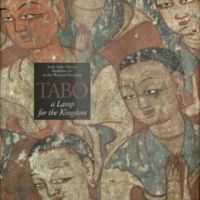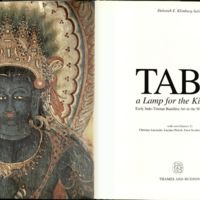Tabo: a Lamp for the Kingdom: Early Indo-Tibetan Buddhist art in the Western Himalaya
Dublin Core
Title
Tabo: a Lamp for the Kingdom: Early Indo-Tibetan Buddhist art in the Western Himalaya
Description
"The monastery of Tabo lies in Northern India in the secluded Spiti Valley, which was at one time part of the kingdom of Western Tibet. Founded in 996 Tabo is the oldest continuously operating Buddhist enclave in India and the Himalayas. Its historical role as an intermediary between India and Tibet and the extraordinary beauty of its frescoes make it a place of unique importance." "The main temple of Tabo is one of the masterpieces of Indian and Tibetan art. Built in 996 and renovated in 1042, the temple is remarkable not only for the extraordinary quality of its sculpture and the decorative paintings that cover every surface, but also for the numerous portraits of royal patrons, members of local nobility, and ecclesiastical figures, all identified by name." "Deborah Klimburg-Salter describes the art, iconography, and rituals of Tabo with the aid of more than 200 photographs, plans, and diagrams."--Jacket.
Creator
Deborah E. Klimburg-Salter
Publisher
Milano : Skira, New York : Thames and Hudson Inc.
Contributor
Christian Luczanits [and others]
Text Item Type Metadata
Original Format
Book
Citation
Deborah E. Klimburg-Salter, “Tabo: a Lamp for the Kingdom: Early Indo-Tibetan Buddhist art in the Western Himalaya,” Humanities Hub, accessed February 25, 2026, https://humanitieshub.sdsu.edu/omeka/items/show/1564.


